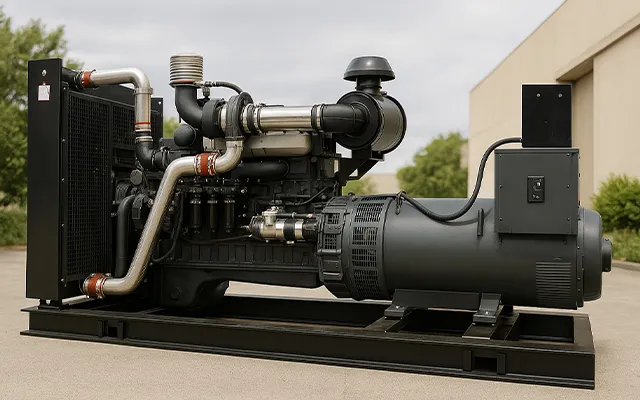A timely oil change is not just a routine task; it is crucial for the efficient operation and extended lifespan of your diesel generator. Diesel generators rely on oil as a fundamental lubricant, playing several key roles in their function. Neglecting to change the oil at the recommended intervals or operating with insufficient oil can lead to severe damage to your valuable equipment.
Understanding How Oil Supports Your Diesel Generator’s Operation
The oil within your diesel generator performs several critical functions:
- Lubrication:Oil forms a protective film that reduces friction between the generator’s moving parts, minimizing wear and tear and ensuring smooth operation.
- Cooling:As generators operate, they generate heat. The oil circulates through the engine, helping to dissipate this heat back to the tank and into the surrounding air, preventing overheating.
- Cleaning:The oil, in conjunction with the oil filter, acts as a cleaning agent by trapping debris, metal particles, and other pollutants, preventing them from harming the engine’s internal components.
- Anti-Rusting:When your diesel generator is not in use for extended periods, the oil provides a protective barrier that prevents corrosion by shielding components from water, air, gases, and acidic substances.
Determining the Right Time for Your Diesel Generator’s Oil Change
The frequency at which you need to change your generator’s oil is not a fixed rule but rather depends on several factors:
- Manufacturer’s Recommendations:Always consult your generator’s manufacturer manual for their specific oil change guidelines. These recommendations are tailored to your specific model.
- Usage:A standby generator that is only used during power outages will typically require fewer oil changes than a generator that runs regularly.
- Weather Conditions:Temperature fluctuations can impact the oil’s viscosity. More significant temperature changes may necessitate more frequent oil changes. Lower temperatures generally require lower viscosity oil.
- Surrounding Environment:If your generator operates in an environment with a high amount of dust, debris, or pollutants, the oil will become contaminated more quickly, requiring more frequent changes.
Adhering to a routine maintenance plan that includes timely oil changes is essential for preventing damage and maximizing the lifespan of your diesel generator.
A Step-by-Step Guide to Changing Your Diesel Generator’s Oil
While professional maintenance is often the easiest and most reliable option, understanding the oil change process can be beneficial. Always refer to your manufacturer’s manual before commencing any maintenance work.
- Use Safety Equipment:Prioritize safety by wearing appropriate personal protective equipment (PPE) before starting any work on your generator. Studies show that wearing safety equipment significantly reduces the risk of accidents and injuries.
- Check the Manufacturer’s Guidelines:Your generator’s manual contains crucial information regarding oil change frequency, the correct oil type and viscosity, warm-up time, and oil levels. Providing these guidelines to maintenance professionals will ensure they properly care for your equipment. Mengjia Group Power Systems, for example, has factory-trained technicians specializing in various generator brands.
- Clean Dirt and Debris:Thoroughly clean the area around the generator to prevent small particles and pollutants from entering the engine during the oil change.
- Check the Generator’s Oil Level:Locate the dipstick, remove it, wipe it clean, reinsert it fully, and then remove it again to assess the oil level. Ensure it is within the recommended range.
- Warm the Engine:If the generator has been idle, run it for a short period to warm the oil. This makes it less viscous and helps to drain out contaminants more effectively.
- Drain the Oil:Place a suitable container with sufficient capacity below the generator’s drain plug. Remove the drain plug (using a damp cloth to handle it) and allow the old oil to drain completely into the container. Ensure proper disposal of the used oil.
- Change the Filter:Diesel generators have oil filters that must be replaced during each oil change for optimal performance. After the oil has drained, locate and remove the old filter using a wrench. Clean the filter mounting area and install a new filter, ensuring it is properly tightened.
- Fill the Generator With New Oil:Consult your manual for the recommended oil type and quantity. Reinstall the drain plug securely. Use a funnel to pour the new oil into the engine, avoiding spills. Check the oil level with the dipstick, ensuring it is between the minimum and maximum marks.
- Start the Generator:Run the generator for a few minutes to circulate the new oil and lubricate the internal components. Then, stop the generator and check the oil level again, ensuring it remains within the acceptable range.
- Dispose of Old Oil:Proper disposal of used oil is essential to prevent environmental pollution. The EPA has specific guidelines for oil management, and local regulations may also apply. Check with your local authorities for approved disposal methods.
The Benefits of Professional Maintenance from Mengjia Group Power Systems
For peace of mind and to ensure your diesel generator operates reliably when you need it most, consider professional maintenance services like those offered by Mengjia Group Power Systems. Their trained technicians can provide expert oil changes and identify potential issues early, preventing costly repairs and maximizing your generator’s uptime. They offer customized maintenance plans to fit your specific needs and budget.
By understanding the importance of oil changes and following the recommended procedures, you can significantly contribute to the health, efficiency, and longevity of your diesel generator.






